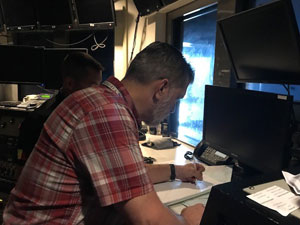 I am Patrick Mills and am currently the Special Agent in Charge of the U.S. Diplomatic Security Service’s Chicago Field Office covering 13 states in the Midwest region.
I am Patrick Mills and am currently the Special Agent in Charge of the U.S. Diplomatic Security Service’s Chicago Field Office covering 13 states in the Midwest region.
I decided to enter federal law enforcement in my early 20s because in a previous life I had been a lawyer in Pennsylvania and had enjoyed it. But, I found that I enjoyed the research part more than the litigation part, and the investigative part as a lawyer more than having clients. In a sense, I enjoyed being a criminal investigator. So over a few years in my mid-20s, I began researching federal law enforcement agencies and I applied to several. I had the opportunity to join the United States Border Patrol early on and that’s where I met several Special Agents with the U.S. Diplomat Security Service, and they won me over, over a year’s period. I applied to them in my late 20s, and I’ve never looked back. No day has been the same, and it’s all been exciting since day one.
Mission of the US Diplomatic Security Service
With the Diplomatic Security Service, we’re the law enforcement security arm of the U.S. Department of State. We work from 32 US cities in the United States and over 160 foreign countries. Our goal in the Diplomatic Security Service is to provide top-notch protection for the Secretary of State and our foreign dignitaries coming into the US and protecting our personnel overseas through our training and experience.
I have had the honor of living and working in 10 different countries and visiting and working in probably another 25 different countries. I’ve of worked with Diplomatic Security Service in Tripoli, Libya; Matamoros, Mexico; Vienna, Austria. I’ve been to Karachi, Pakistan; Baghdad, Iraq; and most recently, Caracas, Venezuela have been my overseas tours.
Duties with the Diplomatic Security Service
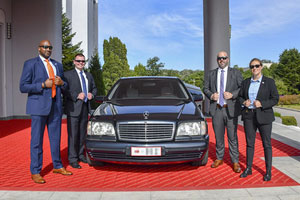
I think all the host nations have taken care of us and have wanted to protect us. So we’ve always had the goal, we being our host nation employees that work with me in the embassy in conflict and the host nation law enforcement itself, to make sure we’re safe in the embassy and make sure our families are safe. I think we’ve been pretty successful and been pretty lucky. I’ve enjoyed some really good relationships overseas.
One of the Biggest Events
One of the biggest events is one I wasn’t expecting. I think that goes toward why I think the Diplomatic Security Service is so exciting. Last year, I had the chance to be the Regional Security Officer in the embassy in Caracas, Venezuela. We did not expect to be shutting down the embassy anytime soon. Out of the blue, I was told we had a certain amount of time, and we had to prepare the facility, and we had to prepare our staff and our resources to possibly close the embassy. I think at the time I had been on 17 or 18 years, and we always train for these scenarios. My hat’s off to the Department and the other colleagues that I work with, Venezuelan and American, in the embassy. While it was very dramatic and stressful for all of us, it was something we were prepared for.
When you’re dealing with a situation of an embassy possibly closing, you have to communicate with the American citizens in the area. It’s important. You have to communicate with the families, the American families that are dependent on the information. You’re also communicating with the other diplomatic corps, which may be in similar situations with you. You’re also talking to your staff that you’ve employed locally what’s going on. Some people have been there 30, 40 years.
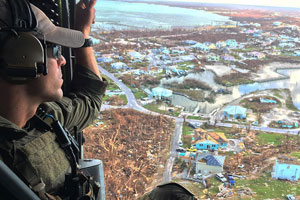
In the situation we had in Venezuela, we were able to interact with the American airlines that were down there, and they were quickly and safely able to get our staff back into the States. Several days into it, we realized we were going to be a small group made up of several of the US diplomats, the Marine Corps that were a Marine Security Guard, and the Agents and our Security Engineering Officer. It was a very interesting and unique situation for all of us, as we weren’t quite sure how long we were going to be staying there, and if they were going to make us go into a smaller group.
For us, the final steps for the embassy were, in a sense, very traditional. It was passed down to us that the final group was going to depart. So, my goal as a Regional Security Officer and my colleagues, the other Agents, the Security Engineering Officer and a Marine, was to secure what we had in the embassy, make sure the embassy itself was literally secure, communicate with the American citizens, provide them options, and then literally find our methods of getting back into the States. It went relatively smoothly, in a sense. We were able to secure the facility in a short period of time and safely get from point A to point B of the embassy to the airport and back into the United States.
Diplomatic Security Service Training
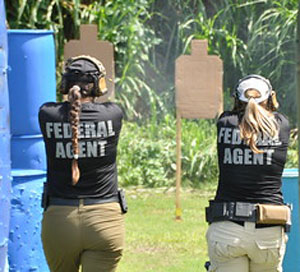
To me, it’s the greatest job in the world, but I realize every situation is different. Since we put our agents and our engineers in far-flung countries, they have to be able to react quickly without often much help from Washington DC. When I was in Venezuela, for example, there was a national power outage, which limits your communication back to Washington. I had a very talented and experienced staff that were able to deal with situations as they arose based on their training and their experience. That’s why when it comes to training and previous experience; we want people from diverse backgrounds. We don’t have a specific group. We want everyone. We want people that can just be cool, calm, and collect and react as the problems come in.
Our goal when you begin is to make you a good investigator, to also help you get good at protection of the Secretary of State and dignitaries, but also give you temporary duty opportunities in our embassies in conflict overseas. In my first two years, I think I had the opportunity to do three or four temporary duty travels all over the place. The goal is to give you just a taste of the experiences that you will have. If you run a secretary’s detail, you have the honor of just going to almost every country there is. But I’ve traveled all over the world; and if you like to travel, it is definitely the agency for you.
How to Join the Diplomatic Security Service
To join the Diplomatic Security Service, I would recommend going to state.gov, looking at the website and the special agent’s vacancy or the engineering officer vacancy or any of their technical vacancies. But for the special agent position, I believe right now it’s a Bachelor’s degree. (See: How long does it take to get a degree in criminal justice.) They also weigh that with career experience.
What makes a good Diplomatic Security Service Special Agent
I would say the best attributes are someone who can be cool, calm, and collect by themselves. We put our personnel literally all over the world. We have the most extensive global security presence in the United States government, hands down. That’s a force of 40,000 men and women. What we expect of people is to represent the United States government in difficult situations.
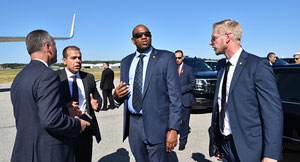
I would recommend anyone interested in working for Diplomatic Security Service, doing your research, talking to friends and colleagues that you may know in the industry, but also we have a very strong internship program that gives college students the opportunity to work alongside us before they finish college. It helps let them see what we do on a day-to-day basis.
Related Links

 Joseph Libowsky,
Joseph Libowsky,